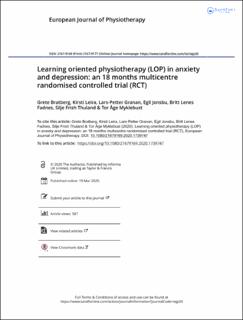Learning oriented physiotherapy (LOP) in anxiety and depression: an 18 months multicentre randomised controlled trial (RCT)
Bratberg, Grete Helen; Leira, Kirsti; Granan, Lars-Petter; Jonsbu, Egil; Fadnes, Britt Lenes; Thuland, Silje Frich; Myklebust, Tor Åge
Peer reviewed, Journal article
Published version

View/
Date
2020Metadata
Show full item recordCollections
Original version
Bratberg, G. H., Leira, K., Granan, L. P., Jonsbu, E., Fadnes, B. L., Thuland, S. F. & Myklebust, T. Å. (2020). Learning oriented physiotherapy (LOP) in anxiety and depression: an 18 months multicentre randomised controlled trial (RCT). European Journal of Physiotherapy. doi: 10.1080/21679169.2020.1739747Abstract
Aim: Although many patients with anxiety and depression suffer from muscular pain and bodily dysfunctions, body is largely ignored in treatment. The aim of this study was to investigate the effectiveness of Learning Oriented Physiotherapy (LOP), based on recent knowledge about overlapping brain networks and the need of awakening body awareness in order to synchronise body and mind.
Methods: Patients with moderate anxiety and/or depression referred to three outpatient psychiatric clinics in Norway during October 2014 to January 2016 were invited to participate. Of eligible patients, 42 were randomised to LOP and 39 to standard psychiatric treatment (controls). Self-reports of anxiety and depression (HADS), health-related quality of life (EQ-5D-5L) and global health (EQ-VAS) were recorded every 6 months from baseline (T1) to 18 months after (T4). Mixed linear model (MLM) analysis was used to estimate overall differences between groups.
Results: After 1 year of follow-up, LOP participants reported higher quality of life and perceived global health than controls. At the end of the trial, there were no mean differences in health outcomes between groups, but LOP participants showed an overall faster rate of recovery than controls.
Conclusions: LOP may be as effective as conventional therapies for patients with moderate anxiety and depression.
